#and one or both of the characters coming to terms with that
Explore tagged Tumblr posts
Text
So, I came to find this post from a sorta weird inflection point. Skip to "And this is the crux" if you don't want my rambling prelude.
I'm looking at building a new D&D character, and decided I wanted to do something different from my usual "Warlock, bending the rules over my knee as much as possible" approach. I started by picking an archetype, or rather, an Archetype feat(1), specifically "Anti-Communist Machine" but refluffed to be pro-communist, cuz... I'm pro-communist and I don't like playing characters who are counter to my principles (and the feat doesn't actually rely in any way on a relation between ideologies). It requires you to play a construct.
That's cool. I started looking at construct races, and found one or two that are about being a construct that represents an idealized form of the creator's species, which led my AuDHD brain to think "Character that looks like "what if soviet propaganda, but by goblins. Or lizardfolk, or whatever." Which is a fun thought. I think, anyway.
It meant trying to research that particular artistic style, to get a feel for it, and therefore, how it might depict its subjects if it was made by a fantasy race.
The thing about Socialist Realism... well, there are two things. The first is that it is a reaction to and builds upon other artistic styles. The second is... well, there's a reason why Soviet and Nazi propaganda have similar visual aesthetic styles. Socialist Realism is, first and foremost, a Realism based style. Which I don't think is inherently a bad thing. Which is why I kinda just said "...um, ok, whatever" when I first saw explainslowly's response above and moved on.
But as I started sketching out "Socialist Realist Statue Goblin," I realized that... well, Socialist Realist Goblin would be incredibly generic. Like... that's sort of the point of socialist realism, or rather, the overarching term that encompasses both the Soviet and Nazi visual aesthetics, Heroic Realism. The idea being to present the artist('s sponsor)'s chosen demographic in an idealized, perfect, form. And the thing about "Perfect Forms" is that... if you diverge at all from the template, it's no longer the Perfect Form. Like, to take it out of direct political ideologies for a moment, if you decide that Arnold Schwarzenegger's body is the Ideal Perfect Form, then even a perfect replica who happens to be blond instead of brunette is no longer Perfect. By definition. So, Socialist/Heroic Realism Goblin would have to be The Platonic Ideal of a Goblin. Which means you have to figure out what goblins would see as their idealized form in light of their standards of beauty. But also, if you step away from "Muscular, thin, young, and chiseled" then it's no longer recognizable as Socialist Realism. Which means that you have to focus on the things that mark a goblin as visually distinct from a human. Which means leaning into, well, creating what would look like a an antisemitic caricature, except as done by someone who thought the antisemitic caricature was the ideal form. Which... is weird. A kind of an interesting thought exercise, but as a catholic-raised, considered-white-in-America, never-been-Jewish artist... it's not one I personally want to explore.
But, ok, so let's say you want to take the thoughts and ideas that gave rise to Heroic Realism, and then apply that to goblins. You still have to figure out what goblins would see as the physical ideal, and what they would see as "degenerate/bourgeois."
And this is the crux.
While the Soviets did not frame things as "degenerate," their artistic ideas come from the same place as Hitler, the idea that anything which strays from visual realism is bad and harmful to society, except that realism must always depict the decreed perfect form. It is the idea that impressionism is evidence of a diseased visual cortex. It is the idea that only someone who is physically and mentally degenerate could produce art that isn't the decreed style.
I don't necessarily think the Chobani ad is trying to do this kind of propaganda. It's more focused on "a sustainable, ecofriendly future includes our products." Which is of course a laughable and in its own way bad thing to peddle. That said, I think realism is perfectly fine as an artistic style. But I get why explainslowly sees the ad and its artistic style, whether with the corporate elements, or those elements removed, is promoting a pernicious ideology beyond "buy our stuff." It's leaning into artistic tropes which have been used to that pernicious end in the past.
...which... I guess is the same problem some people have with goblins. Huh.
-------
1 a feat category on dnd-wiki for feats that describe who your character is and give scaling benefits as they level up
240K notes
·
View notes
Text
Code of Conduct 6
Warnings: this fic will include elements, some dark, such as cheating, noncon/dubcon, and other untagged triggers. Please take this into account before proceeding. It is up to curate your online consumption safely.
Summary: your boss has a difficult time keeping his personal life from bleeding into his work.
Characters: Steve Rogers, this reader is known as Rosie.
Author’s Note: Please feel free to leave some feedback, reblog, and jump into my asks. I’m always happy to discuss with you and riff on idea. As always, you are cherished and adored! Stay safe, be kind, and treat yourself💜
💼Part of the Bad Bosses AU💼

You put Steve’s bag on the couch. It’s a backup he keeps in his trunk since he spilled coffee on himself during the merger meeting. It was your idea and you’re happy you suggested, though you never expected any of this.
Just like you didn’t expect him to ever see your apartment. Especially not today. You quickly swipe up the used mug from the table and take it into the kitchen. You call through the open doorway as you rinse it out.
“Make yourself at home, sir,” you set the cup on the counter and cut the flow of the tap. “I’ll find you a blanket and a pillow.” You dry your hands then flit back into the front room. “I’m sorry, I can only offer up the couch--”
He’s stood before the bookcase in the corner, squeezed into the narrow space. The couch is against one wall, opposite is a shorter shelf with the television and a few bunny figurines below. You’re overly conscious of the cutesy decor as he stands out of place among the pink checkered rug and fluff couch throws.
That reminds you.
On cue, Mitzy emerges, yowling for her evening meal. It’s not quite time yet but she’s an opportunist at heart. The tortoiseshell curls around your ankles and you bend to pick her up. She’s a comfort amid the intrusion of your space. You may have invited him here but it isn’t entirely by choice.
“Cozy,” remarks as he turns to you. “Oh, hi, kitty.”
He nears and Mitzy tries to crawl around your neck. She’s not a fan of strangers. You catch her before she can claw you too much and set her down. She scurries off.
“Oh, sorry,” he frowns.
“It’s not you. She’s fussy. She comes out for food and that’s about it.” You shrug.
“Ah, right,” he sniffs. “I like the bunnies.”
“Um, yeah, those... I just thought they’re cute,” you bounce nervously, “I’ll go get that blanket.”
“Sure,” he rubs his neck and look aways bashfully. “I’m sorry I’m falling apart like this, Rosie.”
“Mr. Rogers, it’s okay. We all have moments.” You assure him. If only he knew how many you had.
“You are so nice. Too nice,” he hangs his head and turns away. His shoulders slant as if he’s trying to make himself small. He’s too big for that.
You leave him and go down to find your single spare quilt and pillow. The blanket you made at a crafting class with Missie and the pillow, you think Dizzie left it here. You’re not entirely sure.
Thinking of the girls, you wish you could ask them for a bit of advice right then. Elfie would know what to do. Billie would tell you to send your boss to a hotel, you know it. She’s probably right. Izzie would surely know what to do.
You come back as Steve stands by the window. The outline of his figure almost startles you. You’ve never had a man in your space. Not this one. You had one long-term relationship and when he decided he liked the girls on Instagram better, he booted you to the curb. Young and stupid. Still got a bit of both of those.
“Are you hungry?” You ask. “I could make some pasta or something.” You put the blanket and pillow on the couch. “Or, I could leave you alone.”
He’s quiet as he stares out at the brick wall across from your apartment. “I’m not very hungry, sweetheart.” He sniffs and reaches to wipe his face. “Do you mind if I shower?”
“Oh, sure, yeah, go ahead. I’ll get a towel.”
You grab a fresh towel and leave it in the bathroom. You busy yourself with dinner before Steve finally takes the invitation. You're a bit relieved to have a bit of time to yourself. You feel like you're still at work.
You're just about done the alfredo by the time he reappears. He's only in a pair of gym shorts, a bit bashful as he keeps the towel around his neck. You peek up and quickly go back to grating parmesan.
"Smells good. I feel fresher," he sighs.
"Mmhm," you squeak.
"Sorry, I only had gym shorts to sleep in. Gonna save the suit for tomorrow."
"That's fine. Did you want a plate?" You offer and turn away.
You never really thought about Steve like that. Never wondered about the man behind the title or the tie. He's just your boss. Still, the vision of his thickly muscled arms and stomach cloys in your head.
You plate him up linguine with sauce and sprinkle over the parmesan. It's a simple meal for a simple budget. He thanks you and sits at the small round table you don't often use without company.
Your phone vibes. You're thankful for the distraction. It's a meme in the group chat. You can't wait for the night out.
You sit with Steve to eat. You try not to look at him.
"So, who were you texting? Not to be nosy."
"Oh, it's... my friends. We're going out this week. Haven't seen them in a while."
"Sounds fun," he tries to smile. You feel bad for him.
"Maybe Bucky will be free," you suggest. "Probably a good time to catch up."
"Yeah, if he wasn't so busy at work. New partner, I guess. They don't get along."
"No? That's too bad. He always nice to me," you twirl the thick noodles around your fork.
"You like him?" Steve asks.
"Well, he's friendly. Can't say that about everyone."
"Right," he nods and takes a bite. He lowers his lashes and wiggles his nose.
"And he's your friend so... he must be as nice as you."
He swallows and looks at you with a sigh, "you're too good to me, Rosie. I'm such a mess and--" he pauses, "and you're a great cook. This is delicious."
"Oh thanks. It's pretty easy to make," you assure him.
"Yeah? Maybe you can show me. I'll have to learn since..." he leans forward suddenly and catches his head in his hands. He shoulders heave and he sobs. "I'm sorry, Rosie. I'm just going through it-- It keeps sneaking up on me."
Your heart wrenches. You feel so bad. You're not sure what to do but then you think of your friends. What would you do if they were heartbroken?
You stand and gently touch his shoulder, "it's gonna take some time."
He sniffles then suddenly, he opens his arms and snags you in and embrace. He buries his face in your stomach and weeps. You stand, frozen, and look down at his golden hair. You cautiously bring your hand up to caress his head.
"It's okay, sir, shhhh," you coax him gently. Maybe if he cries it out, he'll get some good sleep.
#steve rogers#series#au#marvel#mcu#drabble#avengers#captain america#dark steve rogers#dark!steve rogers#steve rogers x reader#code of conduct#bad bosses
94 notes
·
View notes
Note
Hi, hope you're doing well!
I had to unfollow you/block a lpt of tags for a while until I beat datv but I'm so happy to be back. You're one of the first da blogs I followed, and I see you've gotten a lot of argumentative people at the moment, but I just want to say I think that you're great, and I appreciate the candid way you answer people.
Just a quick question, you said Taash's rivaini route had a lot of bullshit? I've just beaten the game for the first time and that was the route I chose so I was wondering if you could elaborate?
Thank you!
Disclaimer: A lot of this is written from a personal place. In no way am I trying to discredit anyone who feels differently. That even includes Trick Weekes, when it comes to the gender stuff at least. And please keep hatred of Taash out of this post; as I say in the end, I do still really enjoy Taash as a character!
The player first meets Taash when still identifying as a woman. However, Taash soon comes to realize they are not a woman; they are non-binary. While most of this answer will be quite critical of Taash’s story, there are positives I would like to acknowledge first. For example, I do think that the dialogue options surrounding the acceptance of Taash’s gender is fairly good. I like that you can be encouraging but not pushy about them exploring their identity further, when the topic first comes up. If you play as a non-binary character yourself, you are able to relate to Taash on a personal level, and provide them with a sense of kinship outside that which they seek from the Shadow Dragons, (who apparently double as both abolitionists and queer support group?) The game makes it clear that Taash’s gender is not just player-reactive; if the player chooses to avoid Taash’s personal questline, Taash still later on announces they are non-binary and use they/them pronouns now, with a game notification letting you know they went and embraced that with the help of Neve and Harding. And while some people have criticized the use of terms like non-binary as “not being fantasy enough” for their tastes, I personally think it’s perfectly fine to be overt like that, instead of dancing around the topic. I saw a post on a recommended Facebook page from some cis person who said they learned a lot about gender diversity because the game went out of the way to be so blatantly inclusive. Yes, there are a moments I can agree are kind of cringe, but lord knows there’s plenty of cringe in other regards as well with the writing, so it’s not like it’s exclusive to Taash’s gender writing. Overall, I think it’s a good exploration about someone stepping outside of a binary view of gender, except for one glaring problem: It is so very, very, white.
Trick Weekes, Taash’s writer, is non-binary themself, but they are also a settler living in the colonial project known as Canada. And that has very clearly influenced their perspective on how they think gender and culture works. With Taash’s writing for the Rivaini route, Weekes paints a picture that their gender journey must come at the sacrifice of their cultural identity, as if the two must be distinctive, separate things. What’s worse, is how binary the cultural identity aspect to Taash’s story is; ironic for a character who is supposed to be about stepping outside a box like that!
Not once, not twice, but three times, Rook is forced to choose to convince Taash if they should be Rivaini or Qunari. The first time, there is an option to say “why not both?” But that option is not present the second or third time the dialogue prompt comes up. The one that hurt me the most is when Taash is clearly having a breakdown over who they want to be vs. who they were raised to be, and the only way to try and console them is to make them pick a singular thing to identify as.
I also think it was a hugely missed opportunity, in choosing to have a bunch of Tevinter humans be Taash’s only source of learning about gender diversity. We know from codex entries that they talk to the Shadow Dragons about that topic, but apparently no one else? Why not have Taash consult a Rivaini Seer for advice, or hell, how about adding more qunari characters who aren’t just standard brutes to mash buttons against in a fight? So, in limiting the scope of this knowledge to just Tevinter humans, Taash is only getting more reinforcement that gender comes before any other cultural identity.
As a Two-Spirit person, I cannot stress enough that gender and culture do not exist in two separate vacuums. They can overlap and/or can be essentially under the same umbrella. So, when Weekes writes about Taash struggling with cultural identity and gender identity at the same time, I can understand that feeling so well. But I cannot understand the written approach Weekes takes. The message I received was “your gender is more important than your culture.” Which again, I must stress is such a white colonial idea of queerness.
I do really like Taash despite these shortcomings from Weekes, though. Just like how I really like Sera despite Kristjanson’s bullshit in Inquisition. I’m not about to hate on a character just because there are certain parts of their writing that I think should have been handled better, when there are more parts that are really fun about Taash. They are so refreshingly autistic-coded in a way that doesn’t punish them for being so, for example.
118 notes
·
View notes
Text

Where Luck Meets Grace
Summary: Tasked with investigating Aventurine, the infamous IPC strategist and gambler, you—a reserved Halovian and estranged sibling of Robin and Sunday—are drawn into a battle of wits with the charismatic risk-taker. What begins as a professional confrontation turns into an intricate game of strategy, charm, and hidden vulnerabilities. Beneath the tension lies an undeniable pull, one that neither of you can fully deny, as barbs and banter slowly give way to a deeper connection.
Tags: @primordialjadespear, Aventurine x Reader, Enemies to Lovers, Strangers to Lovers, Slow Burn, Flirting & Banter, Mutual Pining, Reserved Halovian!Reader, Gambling as a Metaphor, Emotional Vulnerability.
Warnings: Light psychological manipulation, Mentions of survivor’s guilt and traumatic pasts (briefly hinted for both characters), Power dynamics in conversation, Subtle romantic tension and implied mutual attraction.

[Credits to @imyiths on Twitter/X]
The air in Penacony’s upper echelons was heavy with tension, a silence punctuated only by the rhythmic tapping of Aventurine's gold ring against his glass. He lounged at the VIP table of the Sapphire Spire, the most exclusive club in the city-state, its crystalline architecture shimmering in Penacony's perpetual twilight. Across from him, you stood, your back straight and your wings quivering faintly with restrained irritation, a faint flicker of your halo betraying your mood.
You were an enigma to most: the aloof, forgotten third sibling of the famed Halovian siblings, Robin and Sunday. While they basked in the admiration of the Harmony’s followers, you had chosen to walk a quieter path. But tonight, you had been summoned—no, dragged—into this farce of an evening by your so-called peers, tasked with reining in the unpredictable Aventurine.
“I’ll admit,” Aventurine began, his eyes glinting like a gamble already won, “when they told me one of the Halovians was coming, I expected someone… friendlier.” He leaned forward, resting his chin on his knuckles, the ever-present smirk curling his lips. “Instead, they sent you.”
You didn’t flinch, though his words pricked at you like needles. Instead, you tilted your head, letting the subtle radiance of your halo shimmer as you replied, your voice cool and measured. “And I expected a professional. Instead, I find a jester playing at being a strategist.”
His laugh was as rich as the wine in his glass, cutting through the tension like a blade. “A sharp tongue, paired with sharp feathers. Careful—you might find yourself clipped if you’re not careful.”
Your wings stiffened behind you, feathers catching the dim light as your gaze hardened. “I didn’t come here to exchange barbs, Aventurine. Let’s discuss what you’ve done to land yourself in Penacony’s debt crisis.”
His grin widened. “Ah, straight to business. Very Halovian of you.” He waved a dismissive hand, his jewelry clinking softly. “But where’s the fun in that? A game is far more enlightening than a lecture, don’t you think?”
You opened your mouth to retort, but his words had already cast their spell. Before you could stop him, he produced a deck of ornate cards, shuffling them with practiced ease. “One game. High stakes. Winner gets to dictate the terms of this little arrangement. What do you say?”
You frowned, folding your arms. “I don’t gamble.”
“Everyone gambles,” he said smoothly, sliding the deck across the table toward you. “Some just call it diplomacy.”
Against your better judgment, you took the deck. The moment your fingers touched the cool, embossed cards, you felt a flicker of something—an unspoken challenge, laced with something deeper. You knew what this was: a test of wit, of will. And, perhaps, something more.
The game was tense, your every move met with Aventurine’s sly commentary. Yet, as the rounds passed, you found yourself matching him, move for move, wit for wit. The faintest hint of respect flickered in his eyes, though his smile never wavered.
“You’re good,” he murmured, breaking the silence as he leaned back in his chair, studying you with an intensity that made your wings flutter. “Better than I expected.”
“And you’re insufferable,” you replied, though there was a faint curve to your lips now, a warmth you hadn’t intended to show.
He chuckled, tipping his hat. “High praise, coming from you.”
As the hours stretched on, the game became less about the cards and more about the dance between you. His charm was relentless, his words weaving a web that you couldn’t quite escape, even as you countered him with your own measured grace.
Finally, as the last card was played, Aventurine leaned forward, his smile softer now, almost genuine. “A draw. How fitting.”
You raised an eyebrow. “You’re telling me this was all for nothing?”
“Not for nothing,” he said, his voice low. For the first time, his gaze lacked its usual playful edge. “I learned something tonight.”
You tilted your head, curious despite yourself. “And what’s that?”
“That even the most unshakable Halovian can falter.” His smile returned, though it was tinged with something deeper now. “And that, my dear, makes you far more interesting than your siblings.”
Your halo flickered, betraying the sudden rush of emotion his words stirred. You quickly smoothed your expression, rising from your seat. “You’re impossible.”
“And yet,” he called after you, his voice lilting, “you’re already planning our next game.”
You paused, wings twitching, but you didn’t look back. Perhaps, just this once, he was right.

#x reader#honkai star rail#hsr#honkai star rail x reader#hsr x reader#hsr aventurine#aventurine x reader#hsr aventurine x reader#aventurine x you#enemies to lovers#strangers to lovers#halovian!reader#slow burn#flirting and banter#mutual pining#reserved#gambling as a metaphor#emotional vulnerability
59 notes
·
View notes
Text
What if the two characters realizing it's ok to not want kids is the twist.
For example: at the start of the road trip, the couple are ostensibly only getting the abortion for practical financial reasons. Obviously they would love to keep this baby, but right now they can barely support themselves, nevermind a whole ass infant. They're just being realistic! That's what they keep telling themselves/their family & friends back home, anyways.
Their first big emotional bonding scene involves a late night "what would you do if you won the lottery" discussion, where they discover that they both have very similar dreams. Going backpacking across every continent, founding and running a sanctuary for large and dangerous animals, working as doctors for refugees in active warzones, whatever. The important thing is that none of those dreams are really compatible with raising kids.
The day before the couple arrives at the abortion clinic, they get an unexpected financial windfall (possibly the lottery discussion led to them impulse buying scratch off tickets at a gas station or something). It's big enough to solve their money problems completely, so all of their "we just can't afford to have a baby right now" reasoning becomes moot. They're flooded with messages from well meaning family & friends congratulating them and saying how wonderful it is that they'll be able to keep the baby after all! Meanwhile, the couple are exchanging mute looks of dread.
The emotional climax of the movie involves the couple coming to terms with the fact that, no, they aren't selfish or bad for still not wanting kids, despite a lifetime of social messaging that has conditioned them to believe otherwise. With an optional side of "oh god, what if s/he wants to keep the baby now, will I have to choose between pursuing my dreams and staying together" angst. The last scene of the movie has them walking out of the clinic hand-in-hand, having just gotten a two-for-one abortion+tubal ligation, plus a vasectomy for the dude.
And then they go get chili dogs.
there's an extremely niche plot in romance fiction wherein our invariably heterosexual leads fall in love after a night of passion leads to an unplanned pregnancy and they're now bound together by an impending child. I cast no judgment on anyone who enjoys this, but since I'm an evil gay and this is my personal nightmare scenario I want to see a zany romance novel premised on the opposite resolution: a couple falls in love while on a whirlwind roadtrip to obtain a legal abortion
#bonus points: one of the requisite colorful characters the protagonists meet along the way is a happily childfree retired couple#they will happily tell you about all the things they've been able to do with their lives that they couldn't have done if they had kids#there's also someone who had kids because that's what they thought they were supposed to want#but now regrets it
26K notes
·
View notes
Text
Why I’m confident that El was willed into existence…
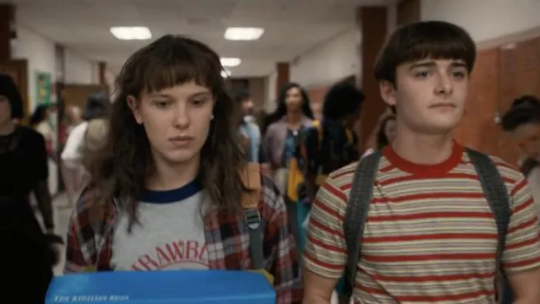
In a show that frequently references superheroes, alter egos, clones, “subs”titutes, and swapping places…
Is it truly that far fetched to believe that our main “hero” is actually the boy who likes to hide in disguise all along?
In other words, let me explain the evidence that Will created El and what it means for the ending of the show.
I’ll begin by saying that even back when I was a GA watching the show, I sensed that there has always been a supernatural connection between the two of them.
Think about it. Will vanishes, El first appears then El vanishes and Will re-appears. They “swap places”. Will is “good at hiding” and thus El takes over as the lead.
El is a masculine girl (at least power-wise), while Will is a feminine boy. They are connected but yet within the show they aren’t that close? Sure they’re “siblings” now but the writers made a choice not to focus on building up their relationship/bond. In fact, we see them continuously being separated from each other. This conveys a subtle message to the audience:
They cannot co-exist.
They both take up the same role within the show. Let me explain…
Let’s start with similarities between Will and El
Both are around the same age
Both are quiet
Both have a mother who is loving yet distant and both mothers are implied to have mental health issues and are heavily paralleled.
Both have a complicated and ab*sive relationship with their father/“papa”
Both are associated with powers
Both have been victims of bullies
Both have trauma and struggled with their emotions
Both are associated with repressed memories
Both are romantic love interests for Mike
Both are heavily connected with the supernatural
etc etc…
Let’s talk symbolism…
I’ve mentioned this many times before but the writers have subtly used the explosion of “Little Boy” the atomic bomb as a metaphor for Will’s disappearance.
“Little Boy” is Will Byers himself. The real “Little Boy” bomb caused a nuclear fission reaction. Fission means to “split in two”. We also have the Phineas Gage metaphor that conveys splitting of the brain.

On top of this, in the flashback of El opening the gate for the first time, we see the Demogorgon feasting on an egg. When El sees this, we see cracks appear and the gate opens. The egg cracks. This is further implied with this line:

If the hair is a nest, the egg is the head. The head “split”/cracked open. Like an egg, the head hatched… which implies a birth!
Notice how they chose an “owl” out of all birds? Owls are associated with wisdom, and the Greek Goddess Athena. How was Athena born, you ask?

Zeus had a “splitting” headache and then Athena was born from his head.
”Splitting” is also a term within Dissociative Identity Disorder when a new alter/personality emerges. Alters are often seen as “superheroes” as they often protect the host/the system from experiencing trauma. They take over, and “swap places” with the host/other alters. There are common alters roles within a DID system, and one of them is called “The Gatekeeper”.
“The Gatekeeper” controls access to the gate, and to the memories (sound familiar?)…
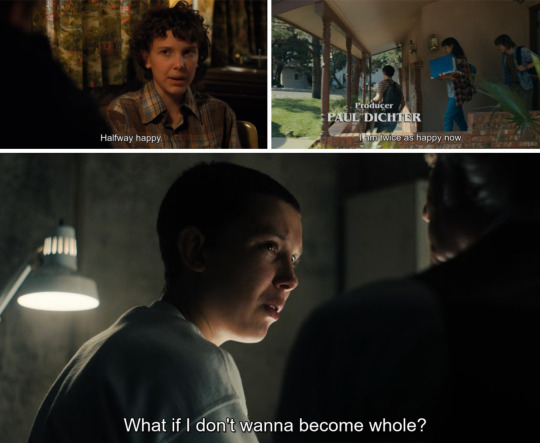
To add to the “splitting” analogy, we have multiple references to El being “half” and not “whole”. Notice how she’s “twice” as happy with Will present, after being “half”way happy? Two halves = a whole.
Another planet/different species
We have many references to the UD being another planet. If the UD is another planet, all those who inhabit said planet are a “different species” or rather, aliens.
As we all know, El is heavily inspired by “E.T.”, a famous alien character. When she comes to “Earth”/the right side up, she is, essentially, an alien. She doesn’t fit in because this is not her world.
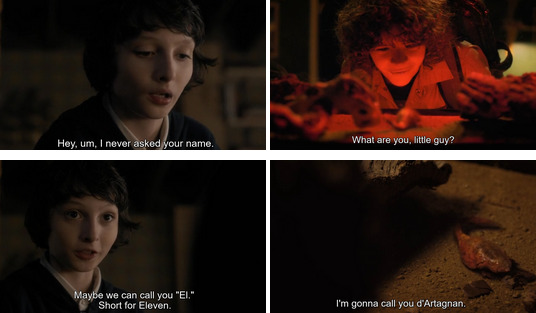
El was even paralleled to D’Art who, as we know, was a “new species” that literally came from Will’s head!
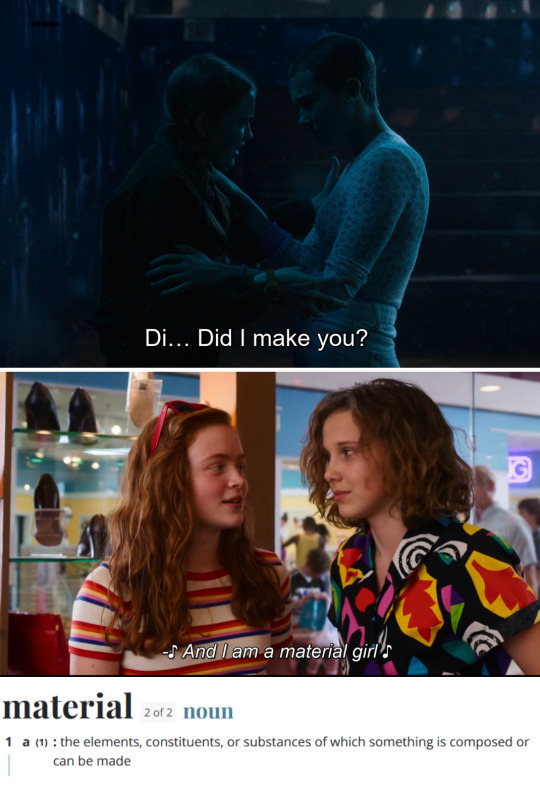
D'Art is a "new species" and El and Max are a "different species" aka "material girls". This implies that they all were created.
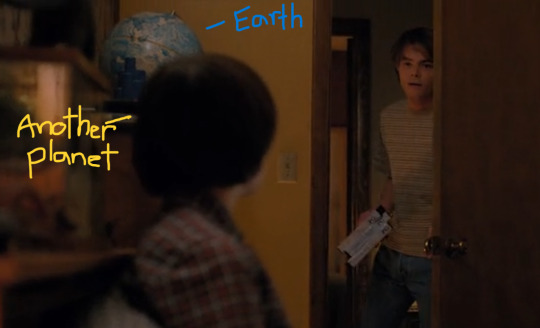
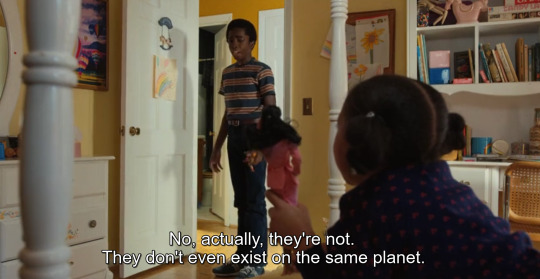
They aren't from Earth but instead they're from "another planet". We are given a hint to this in the shot above on the left. A globe (Earth) near another round sphere (Will's head...)
Relevant Media References Within the Show
Within the show, we have many references to other media- specifically media that contains a character with an alter-ego.

Superman is the simplest one to explain, so I’ll start with that. As we know, Mike said El was “Superman”, and that he was “Lois Lane”, prior to Will expressing his love for Mike using El’s name. The writers chose to reference Superman for a reason and it’s not just because El has powers or that Mike is gay. We are supposed to connect the dots and conclude that:
Will is Superman’s alter-ego: Clark Kent. The seemingly nerdy ordinary guy who loves Lois Lane but who is (secretly) Superman.

(Read the line from Lois above, it is incredibly relevant to Will and El)
Another commonly referenced movie within ST is The Neverending Story.
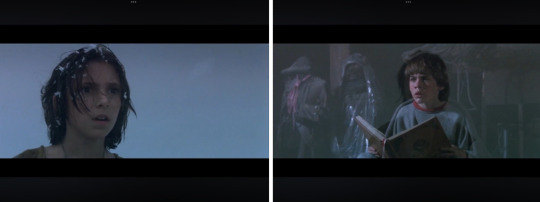
(Atreyu looks into the mirror and sees Bastian…)
The similarities between Bastian (bullied bowl cut boy) and Will are fairly obvious, as well as the similarities between Atreyu (the hero) and El. Well, it turns out that Atreyu was actually Bastian the whole time.
X-Men has also been referenced within the show.

Will asks Dustin for "X-Man 134" in the very first episode. This comic is significant because it was the first appearance of "Dark Phoenix".
In the book the Dark Phoenix is accidentally unleashed by the Mastermind who is tinkering around in Jean's brain trying to unlock the full potential of her powers. x
I argue that the "Mastermind" is actually Will himself who unleashed El into the world. He cast "fireball" unleashing El, the phoenix.
That's not the only X-Men clue however...
In the original Montauk script, it was X-Men 269 that Will asked Dustin for.
@threemanoperation made an excellent post about that here.
There are clear references to gateways and "splitting" which are incredibly relevant to this theory.
Karen's Novels
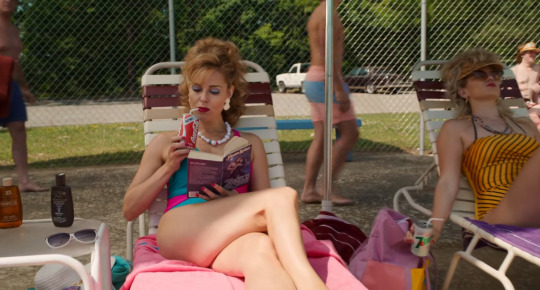
In this scene, Karen is reading a book called “Tender is the Storm”. In that book, there’s a surprise twist at the end:

These two "twins" that the main character is torn over end up being the same person.
Now keep in mind, the previous novel Karen reads also has clear relevance/foreshadowing. Credit below goes to @/kaypeace21, her post is here.
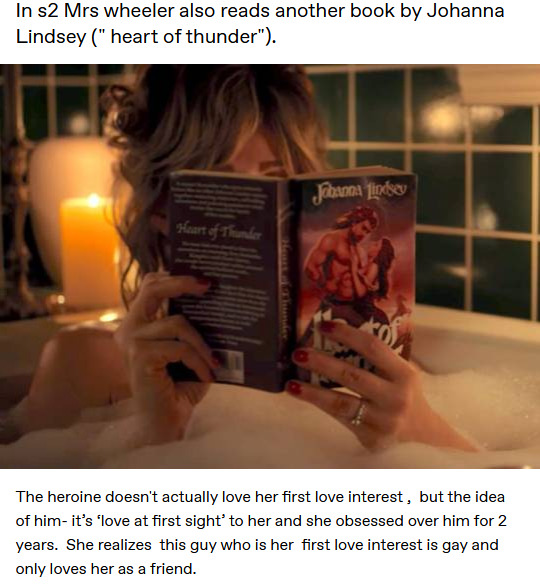
Sound familiar?
Hawkins Lab/Tunnels
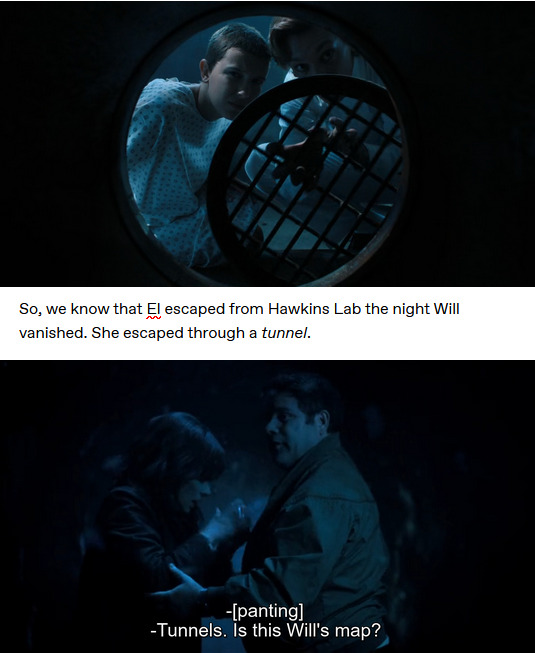
Tunnels are something that we see a lot of... especially in Will's drawings in ST2. He draws tunnels from his mind... it's his mind map.
So... El came from Hawkins Lab, and escaped through these tunnels.
Hawkins Lab...
There's lots of subtle clues that "Hawkins" is metaphorically Will. Let me explain...
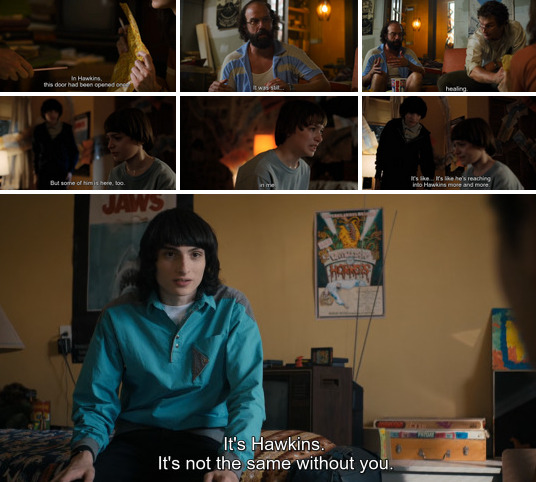
"Hawkins" is still healing from the gate being opened = "Will" is still healing from the gate being opened.
"But some of him is here, too. In me. It's like... it's like he's reaching into Hawkins [me] more and more." - Will
"Hawkins" isn't the same without Will because "Hawkins" *is* Will!
So El came from "Hawkins" lab = El came from "Will's" lab.
A laboratory is a place where things are created.
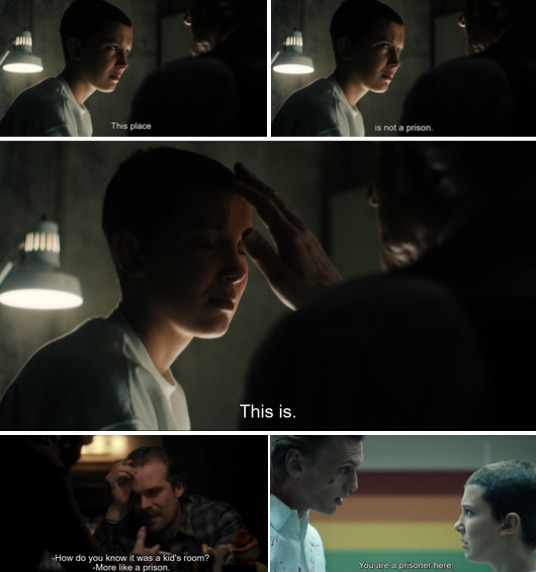
The mind is a "prison" as Papa states. Then we have Hopper and Henry comparing Hawkins Lab to a "prison"/El being a “prisoner”.
El is a prisoner of the mind…
Thus we can conclude: Hawkins Lab is Will's mind, and that is where El came from.
She was a prisoner of his unpleasant and traumatized mind who managed to escape into the real world.
El's Memories
The biggest question is... if El came from Will's mind, how does she have her own memories?
The answer to this is fairly simple:
El has Will's memories...

A major clue of this is in ST2. In a flashback, we see Hopper teach El Morse Code. Later on within the same season, we see that Will knows Morse Code...
Now I know this sounds like a stretch for some, but the major reason why is because we know so little of Will's past explicitly.
We have never seen Will and his father Lonnie directly interact. But through many many clues we can infer that Lonnie had a profoundly negative effect on Will. Not only was he obviously homophobic and a deadbeat father... but many clues point to him being so much worse. I talk about much more in this post.
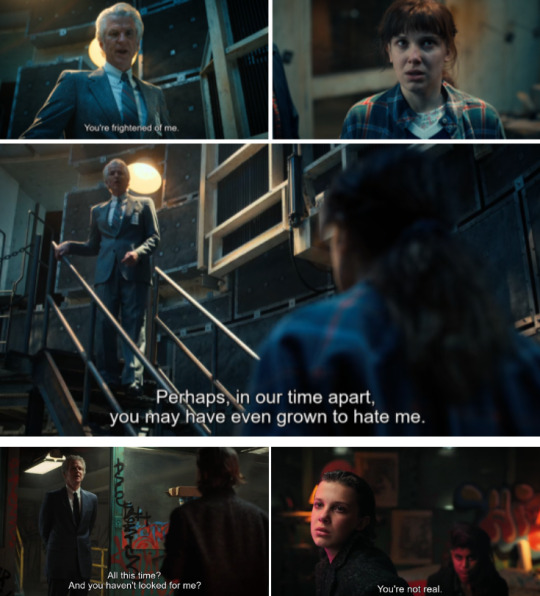
"Papa" may not be real, but rather a manifestation/altered version of Will's father.
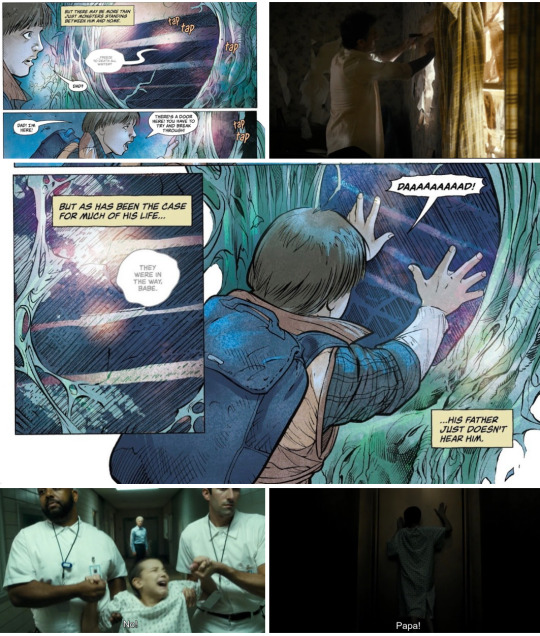
In one of the comics, we see a clear parallel here between El and Papa and Will and Lonnie. The father shutting out the child and ignoring their cries.
Perhaps the biggest clue of El having Will's memories, however, comes from 4x02.
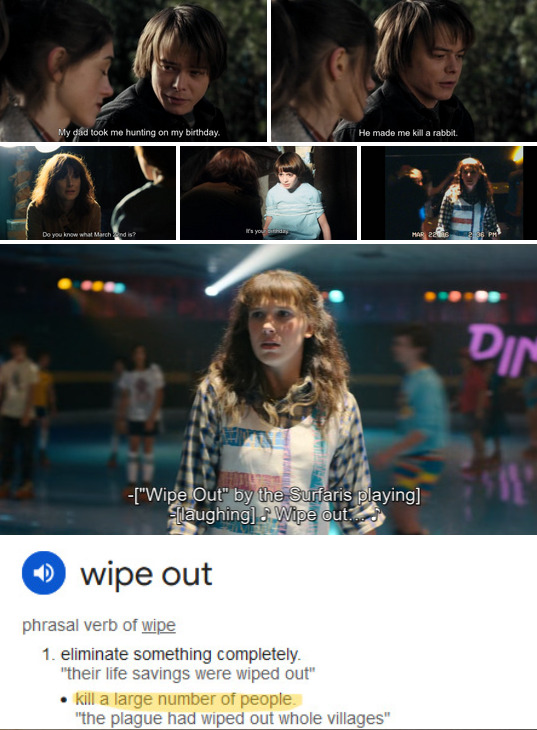
Lets break this down:
In ST1, Jonathan tells us that his father forced him to kill a rabbit on his birthday and it was traumatic for him.
In ST2, March 22 is established as Will's birthday and we are told by Owens that "The anniversary of an event can bring back traumatic memories."
In ST4, we are told that "our brains protect us from trauma" by repressing memories.
In ST4, Will's birthday (the anniversary) is forgotten (repressed memories).
In ST4, on March 22, El has flashbacks to a massacre... and the song "Wipe Out" plays. "Wipe Out" can mean two things: to kill (a rabbit?) and to eliminate something completely (memories).
So... with all of that knowledge... wouldn't you say that it's interesting that El has traumatic memories on Will's birthday?
I think it's fair to conclude that:
Will experienced something very traumatic related to his father on his birthday (March 22), and he has repressed the memories. El, as the "Gatekeeper Alter"/superhero protecting Will/the system, has access to Will's memories.
Gatekeepers control access to specific memories or protected alters and can, in some cases, prevent unwanted switching. These alters aid in preventing traumatic memories from escaping from the alters who control them, thus throwing up amnesiac walls to protect the whole system. x
Which is why in the NINA plot line, it was all about El retrieving back memories... Will's memories. Or rather, altered versions of his memories.

Just to re-affirm the point that Will does not have his own memories... we were gifted with this subtle clue.
"Larry" is a nickname for Lawrence/Laurence. Lonnie is also a nickname for Lawrence/Laurence. So basically:
Will doesn't remember Lonnie. Or rather, he only vaguely remembers Lonnie.
El has Will's memories of Lonnie, and we see them through her flashbacks with "Papa".
This is exactly why we never see Lonnie or rather rarely have any direct mentions of him within the show. He is a deeply repressed memory.
I could go on about this because there are tons more hidden clues but this post will get FAR too long.
Why did Will create Eleven?
Wherever you go, the number 11 seems to find you - this is an angel number. x (credit to @thestrangestthing89 for pointing this out).
To answer this question very simply: Will created El as a replacement for himself. She was his "guardian angel" to protect him from his trauma, but also to erase him.
We really do not discuss this enough, but Will has crippling self-esteem issues! That's why he's so selfless and that's why he always tries to hide. He doesn't believe he's worthy of... anything.
El is a strong, brave, and socially acceptable version of himself. She has superpowers and she can be with Mike, because she's a girl. It'd be acceptable.
But over time we see that El could never replace Will, nor does she want to! El replacing Will causes everyone to be miserable. Will, Mike, his family, and El herself.
How it may be explained within the show
So, DID itself was not a term that existed within the 1980s, it was called "Multiple Personality Disorder". My guess, however, is that they will not use any specific medical term. They will, instead, use a DnD term:
"Changeling" x
According to folklore, a changeling was a substitute left by a supernatural being when kidnapping a human being. x

After Will vanished, El, a supernatural being, appeared in the same place. This whole time El was a "changeling"/substitute for Will.
El's Ending
El's ending has been a hot topic as of recently, for a good reason. People are scared she'll be killed off and express their discontentment with that. Will she be killed off?
Not exactly. Let me explain.
El is E.T., an alien who ends up returning back to their own world. The same thing will happen to El. As I explained, El came from Will's mind, and she will return to Will's mind! This will be her own choice, because she's not adapting to the real world. It's been a constant loop for her, and she's not happy. She hasn't felt like she belonged.
She's tired of being forced into roles that aren't her own.
El and Will will "combine" via fusion. This is where the "Little Boy" metaphor for Will returns. El came into the world via "fission" (splitting) and will return via "fusion" (combining back into Will).
The important thing to note here is that she will not "die".

As Henry states, she will live on in the mind. Most likely, a much more pleasant version of the UD. My guess is her ending will be similar to Frodo's at the end of Lord of the Rings.
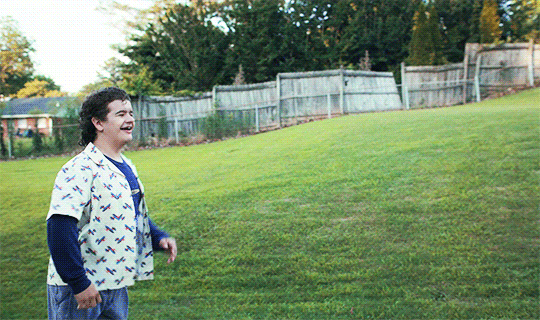
(Notice how she disappears into Will? That's obviously intentional visual foreshadowing).
I have even more to say on this but this post has been long enough!
What are your thoughts?
57 notes
·
View notes
Note
I really can’t take the “mudblood” insult that seriously. I see people in the fandom comparing it to racial slurs, but Wizard “blood status” isn’t the same as race, it’s a aristocratic class hierarchy. So calling someone a “mudblood” just sounds like a mean way of calling someone peasant or pleb.
In my country, Spain, many regions have their own languages and cultures, and there is a variety of nationalist movements regarding this. Some are more peaceful, while others have had armed terrorist groups that carried out attacks against civilians, and others simply opt for institutional approaches with the government.
Both of my parents are left-wing catalan nationalists because it was common among young people from families that spoke the language during the 1970s, at the end of the dictatorship (which heavily oppressed languages other than Spanish and promoted absolute centralism and repression of other internal cultures) and during the transition to democracy. My parents are quite different in terms of character and life perspectives, but they strongly agree on this point: our language and culture must be preserved above all else, and they see Spanish as a "threat."
My parents are leftist, very progressive, and people who, in their time, were way ahead of their era. They taught me from a young age to normalize many social issues that were considered rare at the time. But still, every time I’ve mentioned a guy I’m dating or have met, the questions are always the same: Does his family speak the language? Does he speak it at home? Do his parents speak it? And beyond that, they’ve even asked if the surnames are of Catalan origin. Because this is very common among families that prioritize the preservation of language and regional culture: knowing whether a surname is regional or not.
My father wouldn’t mind if his grandchildren had a Galician or Basque surname if it couldn’t be Catalan, but a Spanish surname? I know he wouldn’t oppose it, but he wouldn’t be thrilled about it. My mother wouldn’t oppose it either, of course, but I know that if I end up with a long-term partner whose family is not bilingual and doesn’t have our traditions, but instead comes from a "Castilianized" family, she wouldn’t be entirely happy. Because that’s how nationalist thinking works in a minority that wants to preserve its customs and way of life—even if there’s no conscious prejudice or discrimination, there’s a desire for one’s children to marry people with surnames from their culture, to speak their language, and to have families of the same background. Or, if not exactly from their language, at least from other regions with minority cultures, because that way, the culture is perpetuated, and it also feels like a way to push back against the dominant culture that tries to absorb the others.
What I mean by this is that the issue of blood purity in the HP universe has always felt very similar to the nationalist mindset I’m talking about: a social minority with its own customs and traditions that feels threatened by the increasing dominance of people who don’t belong to that same culture and who, moreover, pose a risk to their customs. These are very closed communities that want to preserve a certain "purity" in their descendants—not at a racial level but for an intrinsically cultural reason.
We’re not talking about a structure of economic and political oppression in which these communities have systematically oppressed others. There has been no plundering of their lands, no trafficking of people, no dehumanization that led to slavery. There has been no entire social, economic, and cultural framework that relegated Muggle-borns to being treated as less than animals. Muggle-borns have had rights from the very beginning: they could move freely in the magical world, enter the same shops, go to the same banks, and eat in the same places as pure-bloods. They could marry pure-bloods without issue. There have been no laws granting pure-bloods political authority over Muggle-borns. They have been equals under the law and have had the same rights. They have been able to study at the same school, share the same common room, dormitories, and dining hall. They have been able to access jobs, become professors, or work at the Ministry.
There is absolutely no racist-based country where, before civil rights movements, racialized people were on the same level as white people as political subjects. Therefore, comparing blood purity to racism is completely inaccurate. Doing so is simplistic, ignorant, and disrespectful. Blood purity has much more in common with European nationalist movements like the ones I’ve mentioned—those with an independence-based background in their own countries.
My mother and father probably have nothing in common with Lucius and Narcissa in terms of their worldview since the Malfoys are conservative aristocrats, but they do share one key trait: they clearly have their preferences. My mother would rather see me with a right-wing person from a Catalan-Valencian, Basque, or Galician family than with a "castizo" Spaniard—just as the Malfoys would likely prefer their son to be with Ginny Weasley rather than a Muggle-born.
This is why many people compare the Death Eaters to the IRA in the 90s. To me, they resemble the nationalist terrorist group ETA here in Spain far more.
I’m sorry, but no, they are not the KKK. That’s an entirely Americanized view that has nothing to do with the social and cultural context of 90s Britain or Europe in general. Americans who don’t understand the social and political dynamics of late-20th-century Europe should just keep their mouths shut—because not everything revolves around their sociocultural context. Libraries are free, and opening a history book doesn’t cost money.
#blood purity#mudblood#muggle born#muggles#wizards and mugles#wizarding world#wizards#pure blood#death eaters#harry potter#harry potter world#harry potter meta
38 notes
·
View notes
Note
Here’s the thing I DON’T understand ever since being in the Helluva Boss fandom.
I’ll never be one to claim that Helluva Boss is a masterclass of storytelling, because it’s not. It has its flaws: plot structure is a bit disjointed at times, tonal consistency could be better, sometimes the humor is not well balanced with the emotional moments, and some episodes can suffer from speed rail pacing, “Mastermind” is the first episode that comes to mind.
But also a lot of what this show does well with its characters still makes up for it, and the show has been getting better about ironing out the flaws I mentioned.
The show’s writing isn’t perfect, but it’s far from having the worst writing I’ve ever seen, so…why does is it THIS show that pushes people’s buttons so much?
Why is THIS the show that sparks the creation of hundreds of YouTube videos with over 50k views or more yelling about how much people think it sucks?
🤖💁🏽♀️: Your point about the disproportionate criticism of Helluva Boss touches on a significant issue in media reception: the relationship between production context and audience expectations. It’s undeniable that Helluva Boss faces an outsized level of scrutiny, and much of that can be attributed to the fact that it’s an independently produced series created by Vivienne Medrano, a highly visible and accessible online figure. Unlike shows backed by established production companies, Helluva Boss operates without the institutional legitimacy that often insulates mainstream media from this level of hyper-focus.
For comparison, consider Avatar: The Last Airbender and Bojack Horseman, two critically acclaimed shows produced by major companies—Nickelodeon and Netflix, respectively. Both series benefit from larger budgets, industry connections, and an inherent credibility that allows their audiences to extend more generosity toward their flaws. And while these shows are widely celebrated, they are not without their shortcomings. Avatar, for all its masterful world-building and character development, struggles with romantic subplots. The dynamic between Aang and Katara often feels forced and awkward, with Aang’s possessiveness clashing against Katara’s more maternal demeanor. Meanwhile, Zuko and Mai’s relationship lacks chemistry, (💁🏽♀️: though Mai’s defiance of Azula? “I love him more than I fear you.” — rad af).
ANYWAY.
Similarly, Bojack Horseman, while lauded for its exploration of mental health and the consequences of fame, is deserving of some of its criticism for its jarring tonal shifts between absurd comedy and bleak drama. Bojack himself frequently escapes meaningful consequences for his actions in ways that challenge narrative cohesion. However, these flaws are typically contextualized as part of the show’s complexity rather than as fundamental failures, largely due to its association with a respected platform like Netflix.
In contrast, Helluva Boss is rarely afforded the same critical nuance. The show’s tonal experimentation (arguably a feature, not a bug) and character-driven storytelling are often dismissed as structural weaknesses rather than creative choices. This disparity can be partly attributed to the persistent “hate boner” directed at Medrano, whose visibility as a creator makes her a convenient target for criticism. The expectation that independent creators should produce flawless content, while mainstream studios are forgiven their imperfections, reveals an inherent bias in media consumption.
Ultimately, no media text is perfect—not Avatar, not Bojack, and certainly not Helluva Boss. But the point of analysis should not be to determine whether a show is “good” or “bad” in absolute terms. Thoughtful critique involves engaging with a text on its own terms, recognizing both its achievements and its limitations without letting external biases dictate its value. The disproportionate vitriol directed at Helluva Boss says more about the audience’s biases and expectations than it does about the show’s quality.
And on a personal note? We enjoy our gay demon furry cartoon 🤷🏽♀️🤖💖
#this is a vivziepop neutral blog#vivziepop#Spindlehorse#hellaverse discourse#helluva boss#helluva boss meta#hellaverse#fandom meta
28 notes
·
View notes
Text
I ran out of tag... (It's mostly like two things that end up becoming annoyingly intertwined the more the series goes on). He was only powerful when it was convenient to the power scaling, which led to him being constantly put in otherwise intensely traumatizing victim situations solely to spur the main character into saving him no matter the cost. Which normally would have only furthered his unrealistic inferiority complex (and also his fear of weakness as well as distaste for weak people given how many people VICTIM BLAMED HIM, which you'd think would only confirm his fucking bias??) which OOPS was made into a... realistic inferiority complex?? Somehow solely to show that the MC somehow managed to grow past the underdog he never fucking was, and since the fans adored this, that became his only character! Yeah, somehow THAT was his big character growth...
He went from a complex, morally grey character to UwU empty ship fodder, and the fans of the series ate it up SO much that one of the main villains (one of the only people who genuinely acknowledged the strength and horrible treatment of my silly guy) telling him 'You're useless actually, I just want to kill you to make that other kid sad lol-' is seen as his PEAK. That. That's his peak. That's the "good ol days" the shipdom romantacizes. A villain poking at his weakness and deepest insecurity is somehow the canonizing moment of the ship (and it doesn't even happen, MC gets mad at his best friend's death for three seconds and then effortlessly kicks the villain's ass, as like the shittiest cherry on top) < it only gets worse from there!
I was also a shipper back in the day, and, in hindsight, I really should have seen the whole shitshow coming, but unfortunately I went on to dedicate six years to this hyperfixation that continues to haunt me three years after I attempted to quit the fandom cold turkey. It didn't even work.
reblog this with one canon thing you dislike / think is flawed about your blorbo and/or the way they were written
#the sheer inconsistency of the writing#deadass the story relied SO much on Tell Not Show that one of the STRONGEST main characters (in the MC's age range at LEAST)#is constantly and continuously victimized#and this is supposed to be his 'character growth'#but because him constantly being put in victim situations ties him to the main character everybody cheers and makes him into ship fodder#the SERIES in its finale made him into ship fodder but ofc it's a damn anime so gay people can't ACTUALLY exist#so his entire character- being the ONLY one that had growth being one of the most HARDWORKING and DEDICATED mfs on the cast-#ended up being absolutelt nothing.#at thr end of the day his BIGGEST FEAR FROM DAY ONE was just randomly canonized and his 'growth' turned into...#accepting the inferiority complex he had built up for himself based on absolutely NOTHING#to the point where ONE OF THE GODDAMNED VILLAINS tells him his only worth is his closeness to the MC and would you GUESS#people. fucking. cheered.#like there are soooo many things I could rant about this guy#first of all constantly being stuck as a victim doesn't actually make you sympathetic?? and it was almost ALWAYS at the negligence of the#adults around him. He was an ASSHOLE yeah but he was a TEENAGER who learned everything from the adults around him#only for those very same fuckers to turn around and verbally and PHYSICALLY berate or degrade him for upholding the values THEY INSTILED#second-ish the fact that he's contextually one of the strongest main characters in the entire series yet he CONSTANTLY gets nerfed#and forced into otherwise incredibly traumatic situations that would have HINDERED HIS PRE-EXISTING GROWTH- and it's all to make the#'underdog MC' shine and get the glory of saving the dude who HATES HIM. JUST LEAVE HIM ALONE MAN. THAT IS WHAT HE IS ASKING.#MC isn't even treated like an underdog either. He gets things SO effortlessly it makes you wonder why the hell everyone else even works#the series is RELIANT on his victimization. but it ties him into a ship he doesn't want to be in so people eat it up#then despite EVERYTHING he's been through HE UNDERGOES SEVERE CHARACTER GROWTH#he COMES TO TERMS with his tendency of lashing out and apologizes to the MC for treating him poorly due to his made up inferiority complex#and from then on it's just treated like a Canon Fact he is and always was inferior to this guy who put in. almost none of the actual work.#at the VERY least the series from the MC'a perspective shows the fact that he heavily idolized and looked up to my boy#but then the shift in perspective and suddenly every interaction with them is fucking 'he's ahead of me like he always has been'#buddy his fucking battle tactic is throwing himself into a lion's den and sheepishly laughing when he comes back burtally maimed. what.#what was once OBVIOUS BIAS became somehow OBJECTIVE FACT in order to half fucking traumabond this kid to someone who made him feel like shit#and that's not to say his actions towards said kid were excuseable- he was a bully and an asshole! Both things the MC just elects to ignore?#but at the end of the day the MC made him a WORSE person and he KNEW that and was trying to ESCAPE from it. He should have been allowed to.
163 notes
·
View notes
Note
Why byler? Is my question what is it about them that’s so popular
ooo this is a fun one. im assuming you may be one of my newer followers who didnt follow me when i was in the byler trenches. welcome. let me explain.
i think probably the biggest reason people gravitate towards byler is that its extremely fun for people who love film analysis because most of us genuinely believe it will happen in s5. for me specifically, this is the entire reason im here. i first started liking byler when s2 came out but it was casual. i just thought they'd be cute together. once s3 came out and i saw someone point out that mike was framed perfectly in a closet, that was my turning point. thats when i got insane about them because i actually believed its where they were headed.
its always fun to ship your favorite characters and engage in fanfics and fanart, but when theres a genuine belief that this is the direction the story is actually going in, its just a completely different experience. its a whole other world. its no longer about the characters themselves anymore. its about the cinematography, the props, the color palettes, the music choices, the blocking, the lighting. all of these things and more have provided evidence for why we believe byler will be endgame. its the perfect ship for people who are really passionate about filmmaking as a whole.
many of us, including myself, got our degrees in film or have a background in filmmaking. ive made my own films and i plan to make more. one of them was screened at a festival. ive written academic papers on shows and movies. i've taken college film classes where my professors talked about stranger things. im a professional photographer which coincides a lot with film. i have this blog to talk about my favorite fictional media online. every time i watch something new i read long analyses on the media. if they dont exist, i write them myself and post them here. i love talking about and learning about and watching cinema on a much deeper level than someone who just throws on a show when theyre bored. so watching two complex characters not only have romantic tension in their actions and dialogue alone, but also have enough depth to analyze the practical filmmaking choices that prove they are going to end up together…. well its like fucking cocaine to me.
another reason is that mike wheeler, in my opinion, has the potential to have some of the most well written internalized homophobia ever. and i think he differs greatly from a lot of other characters with internalized homophobia because the writers have had the patience to not fully confirm his sexuality until the final season. many other queer characters who struggle with their sexuality come to terms with it over the course of one season or less. or they write it with dramatic irony so the audience is always well aware they are queer from the getgo, even if the character doesnt know yet. while theres nothing inherently wrong with any of these choices, i think having a more outside perspective on internalized homophobia and having that perspective be told slowly will make for a much more authentic and powerful queer coming of age story. i think all of mikes flaws and animosity towards both will and el will pay off so much once we know what hes been going through. i believe this character actually has the potential to reach people who arent accepting of the queer community right now.
byler also just resonates with the queer community so much. a lot of queer ships, especially mlm ships, are dominated by straight women, sometimes to the point where the ship doesn't even feel like its a part of queer culture anymore. its just nice to have a gay ship that feels like its for gay people. and as much as i love a really well written tragedy, its also nice that we can see a happy ending so clearly.
in short, its just fun. the whole "will they/wont they" element is fun as hell. ive never had that with a ship before. i tend to lean towards slow burns that i know will be canon (snowbaz <3) or tragedies that are so gut wrenching i dont even WISH they got together (jackieshauna <333) byler however just speaks to my film loving soul on such a deep level. its perfect for me. its so fun to analyze and read other people's analyses. i cant wait to see how it unfolds in s5.
#i honestly love getting asks from people who arent byler shippers#like yessss let me enlighten you#sorry this took me four days to answer#i think im gonna go back into byler hibernation now i have to prepare for severance tomorrow lol#byler#eden answers
20 notes
·
View notes
Text
This book. This book right here. I love it. I love it a lot. Here are some reasons why:


The narration style. I remember when I first read this book, there were so many moments where I'd read a line and think "so relatable". Tori, why are you so relatable?
Tori and Charlie's relationship. I think it's not that common to see a wholesome sibling relationship, so I'm glad that was included in this book. (Also, I don't know if it's just me, but I feel that we don't really see that a lot in Heartstopper)
Tori and Charlie both saw the signs of each other's decline in mental health, and regret never doing anything about it. And they both assure each other that despite the mental health struggles, and despite not doing anything about each other's mental health struggles, they still love each other and care about each other.
There's a scene where Lucas gives Tori a can of Sprite, and Tori mentally notes that it isn’t the drink she likes. Later in the book, Micheal gives Tori diet lemonade, which is the drink she likes. And the beats of these two scenes are very similar.
Also, after Lucas gives Tori the sprite, she asks him about the books he has, and one of them is The Great Gatsby. When Tori asks him what’s it about, he answers “It’s about someone who's in love with a dream." You don't say...
(Basically, I think those two scenes are meant to show that Lucas is in love with idea of Tori, while Michael loves Tori as she is. Lucas goes about his relationship with Tori in the "wrong" way, while Michael goes about it in the "right" way)
The way Tori’s depression was handled felt so…candid for lack of a better term. I feel that depression and suicidal thoughts/ideation is something that is tricky to get right. I think Solitaire is a good depiction of depression. A believable one at least. One where you're able to empathize with the character.
Michael Holden. Just, Michael Holden.
I don't know about others, but I've always read Tori and Micheal's relationship as queerplatonic. You never see that in fiction, so I appreciate it.
The story takes place in winter, and there are so many moments when Micheal shows up in a t-shirt, or otherwise light clothing, and Tori wonders at various points if he’s a human furnace.
Meanwhile, there are multiple lines where Tori is described as a “ghost” or as “cold”.
Nick Nelson beating up Ben Hope. Do I condone violence? No. Do I condone violence towards Ben Hope by Nick Nelson? Absolutely.
The scene where Tori's not having a good day, and Michael comes over to her house to spend time with her so that she isn't alone. In their phone conversation before that, Michael says that Tori reminds him of "an old person who lives alone, like, with cats and daytime television." Michael also seems like the type of person who would keep old people company.
The scene where Tori realizes Michael wanted to invite her to one of his races, a really important one at that, and the minute she realizes this, she instantly books it to the rink. She wasn't planning on doing anything that day, but the minute she learned that Michael had something important going on, she dropped everything to be there.
I think every scene focused on Tori and Micheal is amazing.
To this day, it amazes me that Alice Oseman wrote and published this book at the age of SEVENTEEN!
There was the right balance between dark and mature elements and more wholesome ones. I'd say that's the case for all of Alice Oseman's work, but especially Solitaire, which is considered the darkest. I feel that's a tricky balance to strike, and I felt that Solitaire, even the original iteration, strikes that balance well.
This book has short chapters, and I think that makes it easy to read.
I love the audiobook. I mean the old audiobook narrated by Jayne Entwistle. I've listened to the new one narrated Jenny Walser, and it's good, but I think I prefer the old one. It's so pleasant to the ears. I love her voice.
Thank you for reading!
#solitaire#solitaire alice oseman#osemanverse#tori spring#michael holden#lucas ryan#charlie spring#nick nelson#things i love#ramblings#original post
22 notes
·
View notes
Text



Go ahead and be my world And everything will be okay Just hide there in plain sight Too big to see, yeah to see.
Musings and bonus shots below.
This is a redo of an old gpose, one of my really early ones, which I loved in concept but was pretty rough around the edges in execution. I always wanted to redo it in the new graphics, and of course that makes a huge difference, with the flowers in Il Mheg being night and day in terms of resolution, a truly spectacular environmental glow-up, and of course Urianger is looking more beautiful than ever these days. But I've also learned a lot since then, and am still learning--different tools, lighting, composition, I'm always trying to learn more! I also don't bother using pre-made poses anymore. Character sizes vary so much that with all the adjustment required, I think it's just easier to start with some emotes as a base and then build off of that, and I get much closer to what I was actually envisioning.
And I really wanted to capture this moment the way it is in my mind, because it's a special moment for Ariane and Urianger. They've saved the First, survived all that came along with it, spent some time apart while Ariane came to terms with the deception, reconciled and rekindled their friendship--and now, with the need to bring the Scions home looking increasingly dire, they've finally confessed their love for one another.

As the final preparations are made for their return, Ariane comes to see Urianger in Il Mheg where he is packing up the collection at the Bookman's Shelves to be archived in the Crystarium. Though there is much to be done, Urianger suggests a brief diversion, and so they walk down to the lake, and sit on the shore, their last chance to be together here. Though their affection for each other had been growing for some time before Urianger was pulled away to the First, in a sense Il Mheg still feels like the place where they fell in love--certainly the place they both first knew it.
The future is still uncertain, and Ariane, in particular, is still scared that just now, when they have such a chance at happiness, she'll lose him too. Knowing that nothing is promised to them, she is determined to savor every moment they have together all the more.

#don't mind me i'm just feeling very sentimental about my beloved elfs today (every day)#ariane clairière#urianger augurelt#urianger x wol#wolianger#woluri#ffxiv gpose#anne gposes#the stars are blind my love#shadowbringers spoilers
20 notes
·
View notes
Note
[Taken from under the cut]
"The localization definitely did change some things about the portrayal of Angie’s religion, but I would hesitate to say that they changed the overall feel or messages of Chapter 3. The original was already pretty… well, I don’t know if “atheistic” is the best term for it, but the point of Chapter 3 in the original was definitely to have a kind of clash between western and eastern religion that reached a boiling point. I don’t think any of the general negativity associated with Angie and her cult, or Korekiyo and his séances, was impacted by NISA so much as it was already there in Kodaka’s writing.
As far as I could tell when playing the localization, in fact, Korekiyo’s translator didn’t change or alter much about his dialogue. Other than the “Kiyo” nickname, I agreed with most of the choices they made (translating “Kagoinu Village” and the “Kagonoko Ritual” as the “Caged Dog Village” and “Caged Child Ritual” respectively were really good choices or a localization, in fact, since they made them easier to understand). All of the reveals that happen in the post-trial (as in, those reveals, about his sister) were adapted pretty straightforwardly from the original. Nothing was cut or altered significantly; his motives really were that messed-up.
As for Angie, the term “brainwashing” actually is a direct translation and not something altered or swayed by the localization! The term 洗脳 (“sennou”) comes up as early as Chapter 2 in both the original and the localization. I believe the first instance of it is in an optional dialogue session with Himiko on the night of Saihara’s first training session, where she mentions that she should’ve “had [Angie] undo her brainwashing sooner.” The following morning, when discussing Himiko’s magical show, Angie is pretty quick to change the subject and avoids answering any questions when she’s asked by the rest of the group what she did to Himiko.
What’s more, there seems to be a very intentional correlation between Angie’s talent and Mitarai’s. While not entirely the same, the two bear definite similarities which come to light especially if you do Angie’s FTEs. In her third FTE with Saihara (her 5th overall if you did Kaede’s), she shows Saihara a picture she was painting, only for him to lose consciousness immediately upon looking at it. When he wakes up again and asks her if there’s anything intrinsically special about the painting itself, she says she’s not sure, and that she just “creates her art exactly the way god tells her to.”
It’s pretty heavily implied (more like confirmed, in her FTEs at least) that her artwork is how she gets people to listen to her and do what she asks, both on her home island and within the religious student council she sets up. There definitely seems to be a much larger degree of free will involved with her abilities than there was with Mitarai’s, the game is pretty emphatic about the fact that she does brainwash people to go along with her ideas. The effectiveness of her brainwashing is up for debate, though; Saihara remains pretty unaffected in his FTEs with her despite her best attempts to force him to marry her, Tenko was only pretending to join the student council in order to keep an eye on Himiko, and I highly doubt Tsumugi was ever actually brainwashed because of, well, reasons.
Overall, the general feeling with Angie (in the narrative at least) seems to be that she was someone whose intentions weren’t necessarily bad, but that she still did some pretty unsavory stuff nonetheless. It’s pretty clear that she does, in fact, want the killing game to end—she’s one of the most outspoken characters of the opinion that “greed” and “desire” only lead people to commit murder, and that they’d all be better off staying within the school and making it comfortable for themselves, rather than continuing to try and escape the school.
Unlike other characters who have brought up similar plans before, like Celes, I think Angie did genuinely believe what she was saying, too. There’s an optional dialogue moment in Chapter 4 if you click on the door to Angie’s lab while exploring around the school, where Saihara pretty much outright says that he couldn’t agree with her methods, but that he does realize that she was trying to stop the killing game in her own way, then follows up with a really nice comment about how he’ll never forget her. He has similar comments for most of his classmates following their deaths in each subsequent chapter, but I thought it was a really nice touch nonetheless.
As you point out though, if there is a fault in the localization to be found, it’s in changing Angie’s god altogether from a very general, unspecific god to “Atua.” Ever since I heard about that particular localization decisions, I couldn’t agree with it for a number of reasons, not least of all that it’s extremely disrespectful, as Atua is an actual, real deity in Polynesian mythology. Adapting a real-life deity and applying it to a character whose backstory, island, and god are all deliberately undefined (and fictional) is a very bad choice all around.
Angie already suffers from a lot of bad, racist writing tropes on Kodaka’s part in the original. It’s pretty clear that since she’s both dark-skinned and a “foreigner” (and we don’t know anything regarding whether her pre-game self is actually a foreigner or not) she was designed to be the “exotic, quirky island girl” whose religions and culture teeter between baffling and downright creepy.
The portrayal of her island’s religion and customs already isn’t positive in the original game; between “blood sacrifices,” purchasing organs and children off of the internet, and the hypersexualization of both Angie and her people (she tries to take off Saihara’s clothes in the same FTE I mentioned before, and there’s a lot of talk about the people on her island “comforting” each other sexually or “sharing the bride” at weddings), it feels like Kodaka was just one step short of calling them “un-civilized,” which is… eugh.
Taking all of that messy and unsavory writing and directly correlating it with actual Polynesian culture and mythology is such an incredibly disrespectful decision, moreso when I highly doubt that Angie’s translator for the localization is Polynesian themselves or did any actual research into the subject. There was no need to slap a name onto Angie’s god in the first place—her island and culture are still entirely undefined in-game, so why NISA felt that her religion needed to be equated with a real-life one is still beyond me.
Other than the general racism though, I don’t think a lot of the rest of Angie’s dialogue was changed. There was a brief, optional line in the bonus mode when she comes to invite you for a date where her translator decided to have her say “Alola!” (which, you know, a Pokemon region based on Hawaii isn’t even the same as the Polynesian islands, but okay), but otherwise her translation was pretty faithful to the original dialogue. I think her translator didn’t have too much of a problem capturing the feeling of her character; their main problem was simply the decision to make an unnecessary correlation between Angie’s fictional, made-up religion and all its negative aspects and with actual Polynesian religion and culture.
Overall, I think a lot more of the issue stems back to Kodaka’s own racism and flawed writing, though. I don’t think he was trying to leave a message of “religion = bad, always” in Chapter 3 so much as he was just… unaware of how it might come across to others. Religion in Japan is decidedly different from religion in the west, so it’s important to remember that Kodaka was writing from a Japanese perspective, rather than an all-around western atheistic perspective. He definitely wanted a sort of clash of ideas between Angie’s very foreign, western, cult-like religion, and Korekiyo’s research into eastern culture and spirituality, but the writing got… well, very messy along the way.
This is just my take on it all, anyway! The association with Angie’s religion and “brainwashing” was definitely there in the original game, even very early on, but I do think the localization would’ve improved overall if it hadn’t bothered trying to put a real name to any of it. Thank you for asking this question by the way—it’s always good to clear this kind of stuff up, especially since all of the “Atua” changes must make it really difficult for anyone playing the localization to know how much else was or wasn’t changed in Angie’s dialogue. I hope I could clear a few things up!"
here's a question ive had since the localization came out; did the localization do anything to enforce more of an athiestic bent and put angie and shinguji in a more negative light wrt religion and spirituality (particularly angie)? or has that always been there? the whole "brainwashing" angle felt p harsh, not to mention saying angie's god outright is Atua instead of the general "my god" that the translations seemed to have. plus akamatsu seemed very internally harsh about her god in their FTEs
The localization definitely did change some things about theportrayal of Angie’s religion, but I would hesitate to say that they changedthe overall feel or messages of Chapter 3. The original was already pretty…well, I don’t know if “atheistic” is the best term for it, but the point ofChapter 3 in the original was definitely to have a kind of clash betweenwestern and eastern religion that reached a boiling point. I don’t think any ofthe general negativity associated with Angie and her cult, or Korekiyo and his séances,was impacted by NISA so much as it was already there in Kodaka’s writing.
Keep reading
#drv3#angie yonaga#Hm. Im obviously well aware of the racism of angie's writing#but i never considered that blaming the localization for every fault in v3's writing kind of pretends that it was perfect to begin with#Very well said! Op hasnt been active in years iirc but their posts are very good
134 notes
·
View notes
Note
For the ship ask game: Kalluzeb (bc I'm predictable) or Hera and Kanan in case you've already answered about K/Z :D


It would seem that I’m known for something lmao @kookyburrowing and @bookishbrigitta
What made you ship it?
ok we’re gonna get kinda personal with this one lads 😅. To make a long story short (unless yall want to hear the long version) I see a lot of myself and my journey in kallus and Zeb, both as individual characters and as a couple. Their dynamic has helped me come to terms with a lot of things in my life, plus I just think that they’re lovely.
2. What are your favorite things about the ship?
the YEARNING and the REDEMPTION ARC and the MUTUAL UNDERSTANDING and the ANGST POTENTIAL AAAAAGH
3. Is there an unpopular opinion you have on your ship?
KALLUS👏IS👏A👏BEAR👏
#star wars rebels#sw rebels#swr#asks and replies#garazeb orrelios#zeb orrelios#alexsandr kallus#agent kallus#kalluzeb
20 notes
·
View notes
Note
#4 please !
Now see this could be tricky, because generally if I don't get some key elements written down very quickly the idea flows away again and the 'yet' disappears, even if I remember generally what it was about, but I have one this time! I am still just enough plagued by this vision that it's not out of the question I'll go for the capture, but so far nada.
Idea was basically a Jiang family character study by way of modern au. (So tw canonical abuse.) I started from the reflection, in a modern au very high chance the Jiangs are divorced, because being a divorcee wouldn't necessarily ruin Yu Ziyuan in the modern world, as long as she was allowed to control the narrative enough that she didn’t look at fault, so it might be on the table.
Especially because modern views on child abuse are such that while she'd hold back more than she already does in terms of physical chastisement, Jiang Fengmian would also be under less societal pressure to not interfere in her disciplinary system too much, and both these factors mean he’s more likely to put his foot down.
So, concept: Jiang Fengmian, when his son is eight and his daughter thirteen, forces the issue of taking in his best friends' abused orphan child whom he’s just managed to track down in a nightmarish group home, probably leveraging the fact that wherever their money comes from it's mostly his, something he usually doesn't do, but she has always known he could, and been fucked up about it (reasonable) and hated him a little (less so) and hates him so much more now (understandable but still fucked up).
They were obviously still both pressured into this marriage by their families, because I literally cannot imagine them choosing one another of their own free will, and if they did that would be an au in an even more dramatic way than being modern, and no longer work as a character or relationship study as far as I'm concerned. I mean or it’s a cql-based au, but that’s not the version of this toxic marriage I find compelling.
Situation subsequently deteriorates to the point that when the boys are around twelve some outside party observes and is repulsed or otherwise upset by Yu Ziyuan's treatment of Wei Wuxian specifically--she's emotionally abusive to everyone in the family, canonically, and it harms Jiang Cheng significantly more than Wei Wuxian, which I think is also pretty explicit on the page, but she's more openly antagonistic about going after wwx because he's basically a proxy for her husband, whom she doesn't consider to be someone she's capable of harming.
And ofc in a modern family scenario, being abusive to your foster kid is more plainly personal misconduct than being unfair in how you discipline one of your husband's many students, even if it is his favorite. Which means she's very unlikely to chase him around with a whip, but whatever she does do will sting that much more emotionally.
Anyway the outside judgement provokes a more explicit confrontation than the last four years of maneuver and attempting to balance all the competing needs according to two very different standards. And the upshot is that by the time wwx is 13, the Jiangs are divorced. To avoid making a humiliating spectacle of themselves they present a weirdly united front in court and have a very smooth uncontested proceding, although the closed meetings with their respective lawyers involved a lot of vitriol.
Yu Ziyuan, despite having a smallish trust fund and probably a job of some kind, though one that's more prestigious than profitable like uh. Olympic fencing coach. Idk what they make but it's probably not enormous. She and Cangse Sanren probably competed in the same events back in the day.
Anyway she gets a solid chunk of alimony, the house, and primary custody of both her children, although Jiang Yanli is almost 18 at this point so mostly she just gets Jiang Cheng. Everyone thinks Jiang Cheng wants it that way, including sort of Jiang Cheng; he has this idea that if he has his mom to himself they'll finally have a good relationship, even though he's also terrified of being left all alone with her. He's complicated. Families are complicated.
Also she would never have forgiven him if he hadn't concurred that he wanted to stay with his mother because she was the only one On His Side.
Jiang Yanli ofc does not move out right away when she comes of age, in part because her brother needs her, but she probably does go to college, so she's only around part-time.
Jiang Fengmian, meanwhile, keeps most of his financial assets and Wei Wuxian, and gets his kids on the weekends.
So that's all setup for how you have this situation where Wei Wuxian and Jiang Cheng are entering high school--probably the same school, together, but no longer sharing the commute except maybe Monday mornings--and Wei Wuxian's primary residence is Jiang Cheng's dad's apartment.
It’s really chill. They get a cleaning service in once a week and eat a lot of delivery food, but they do cook at least once a week. The canonical thing where they largely agree about what’s funny and what’s right-or-wrong, and so forth, on the one hand really pops when there’s mostly no external conflict disrupting it, but also probably gains more complexity now that it’s not a thread of positivity fighting for its life against a background of drama. They get to know each other better than they ever had a chance to in canon.
Some of that isn't all that positive, because now they have the space to discover the places where they do actually have the capacity for friction, but both of them are very good at dispersing tension (I do tend to suspect jfm's dad was abusive he sure acts like it), and on the whole it's a good thing.
Jiang Cheng is going to have such a mental health crisis, and Jiang Fengmian is going to handle it so badly. Because of course when his son starts replicating his ex-wife's toxic attitudes and behaviors more now that she has primary custody, he’s going to feel guilty and like it’s His Fault, but he’s going to feel like it’s his fault that Jiang Cheng is growing up to be a shitty abusive person.
And even if he’d never say that the subtext would come through, in the assumptions he made when framing communications and so forth, as in canon, so the thing where Jiang Cheng’s father loves Wei Wuxian more than him, or at any rate likes him better and thinks he’s a better person and prefers his company, would wind up feeding into a self-reinforcing loop.
(Jin Zixuan's nasty public remark about Jiang Fengmian treating Wei Wuxian better than his own children hits Jiang Cheng significantly harder in this scenario, where he's being Tormented by the feeling that all his peers know his dad walked out on him for another son. Wei Wuxian's punch is therefore even more clearly primarily for Jiang Cheng's sake, although Jiang Cheng is probably more inclined to see it as being for his dad's. Jin Zixuan is about halfway between the Jiang kids' ages here, so he's a senior saying this shit to a sophomore.)
So that cycle builds to the point where Jiang Cheng would eventually have one of those rare moments where he resorts to actual violence, because his poisoned feelings are choking him so bad his rationality deserts him.
He’s not going to be nearly as close to actually murdering Wei Wuxian as he was in canon the night the Jiang Sect was massacred, because it’s a less extreme situation, but he still goes for the neck. So Jiang Fengmian is in his home office one Saturday about a year and a half into this new normal, and realizes the boys are fighting. He hears through the wall the accusation you stole my dad. He says to himself, well that’s terrible but interjecting myself into this situation would definitely make it worse.
Then he hears sounds of violence, and then an ominous abrupt silence, and updates that analysis.
And when he opens the door to the boys’ room, Wei Wuxian is being strangled. He’s not really resisting, which is because he’s made the call that that’s way more likely to get Jiang Cheng to snap out of it, and thinks it might make Jiang Cheng feel better to get it out of his system (because he does sort of feel like what Jiang Cheng is going through is all his fault, or at any rate is much worse as a result of decisions made for his sake) and is severely underestimating the dangers of choking, but looks to a third party like he’s already passed out and Jiang Cheng is still at it. Which is to say, it looks like a serious murder attempt on the brink of success.
So that sure made that situation worse!
So yeah that's my idea that I probably won't write but it sure has its teeth in me.
#answers#snarglepop-content#ask#ask game#mdzs#meta#modern au#family drama#character study#i'm really sorry to the person who sent me that madam yu ask i worked on it for SO long but i CANNOT find it in my drafts#i'm hoping i posted it and forgot????#anyway this fic is drawn from conclusions i reached trying to articulate for that ask my thoughts on modern yu ziyuan#and how hard she is to work#because yzy's characterization is pretty exquisitely responsive to her context#in such a way that if you change the context she will either behave differently or become ooc#so she's a major failure point in modern aus because she tends to have her characterization adjusted to fit the needs of the story#its desired beats or themes or whump quota#and if you do this carelessly then either wwx and jc also become ooc#or the story ceases to have consistent internal logic#mdzs is a pretty well-balanced machine!#despite how many elements come across sort of slapdash because mxtx literally did not care about that part#i.e. scale or logistics or history-as-such rather than just some of its societal features#but she didn't care *intentionally* so it's generally insulated from undermining the important beats which is such a good trick ak;kjlsdf#ANYWAY#i'm overly invested in how hard it is to depict this family as shown in the novel#because there's so little information and it's so tempting to disregard some of it to get a simpler narrative#so easy to take madam yu's word about things because she's the only one talking#so easy to punch up the melodrama in the wrong spots or iron out the actual ugly bits#to get something easier to grasp at but less realistic#concept up for adoption if anyone wants btw
22 notes
·
View notes
Note
Hi! Do you have any recommendations for Black Canary stories? Been wanting to learn more about her and I'm not sure where to start/what's assured to be worthwhile.
Hah! I do have Black Canary recommendations, but they also come with a lot of asterisks. Loving Dinah is one of those situations where you spend a lot of time going 'UNFORTUNATELY'.
Where do you want to start?
If you want a story highly focused on Dinah herself?
If you want something you can pick up and fall in love with her without needing context (Dinah has SO much context), get yourself to Black Canary and Zatanna: Bloodspell. It’s probably the only title with ‘Black Canary’ in the name that I can recommend unequivocally without any asterisks.
Personally I have a massive soft spot for Black Canary 1993 (this is vol 2), which vibeswise has Ollie being terrible, Ray’s hopeless crush on Dinah, the first ever Dinah-Babs-Dick-Helena team up and some really fun art design. Unfortunately, it is incredibly written in the early 1990s and so needs warnings for, among other things “this contains a white slavery storyline”.
I do recommend Black Canary: The Best of the Best. Tom King’s doing pretty well at explaining context for everything happening in this story.
If you’re interested in Dinah with Ollie?
Start Grell’s run on Green Arrow at The Longbow Hunters and go from there into Green Arrow 1987. This is probably the most classic period of their relationship that everyone later will reflect back onto. I will however flag that Dinah gets assaulted, badly, during this run, and the fallout focuses far more on the effect that has on Ollie than Dinah herself.
Read Quiver (Green Arrow #1-12 2001) if you want to understand Dinah’s reaction to Ollie’s resurrection.
Go from the Wedding Planner and Wedding Specials 2007 and then read Green Arrow/Black Canary 2007 for at least Winick’s run (#1-14). A lot of people don’t like this run because of what it does to Connor, but if you are down for Dinah and Ollie shenanigans and silliness and banter, I find it highly entertaining.
If you want Dinah and Barbara together?
Start with Dixon’s run on Birds of Prey (the first oneshot is officially entitled “Birds of Prey: Black Canary/Oracle #1”, or just go for Birds of Prey #1 1999) if you want more James Bond missions where Dinah is Bond and Babs is her controller
Start with Simone’s run on Birds of Prey 1999 (it starts at #56) if you prefer Dinah leading a spec ops team for Barbara with a lot of complicated women having complicated friendships.
Dinah with Roy and Lian?
Arsenal 1998. It’s only four issues and it’s just delightful characterisation of the three of them together.
If you want a current run (and don’t want to risk Tom King until the run finishes)?
If you want to read current stories, I would suggest the Birds of Prey 2023 run with Kelly Thompson is probably a slightly better starting point for Dinah than the Green Arrow 2023 run with Joshua Williamson, but you’ll get the gist of Dinah’s two biggest relationships (with Ollie and with Babs) from checking out both.
If you want Dinah’s backstory?
The DC YA graphic novel, Black Canary: Ignite, is reasonably solid in terms of giving context to Dinah Sr, Larry Lance and Dinah Jr relationships with each other. It’s not canonical and it very much picks up the vibes of Black Canary 2014, but it’s probably the best early years version of Dinah that’s been written so far. And again, it’s conveniently stand alone.
Otherwise, some general advice:
Dinah in Green Arrow books tends to be very much playing second fiddle to Ollie
I wish I could recommend more of the Black Canary runs, but 1991 is slight and mostly Dinah being pissed at Ollie, 2007 was used as an excuse to write Dinah’s supporting characters out of the narrative in favour of Ollie’s, and 2014 has striking art but is a version of Dinah that not only has very little to do with other appearances, but gets retconned at the end of the run.
Dinah’s got solid runs in various Justice League books and the JSA revival in 1999, if you want her in bigger team books
19 notes
·
View notes